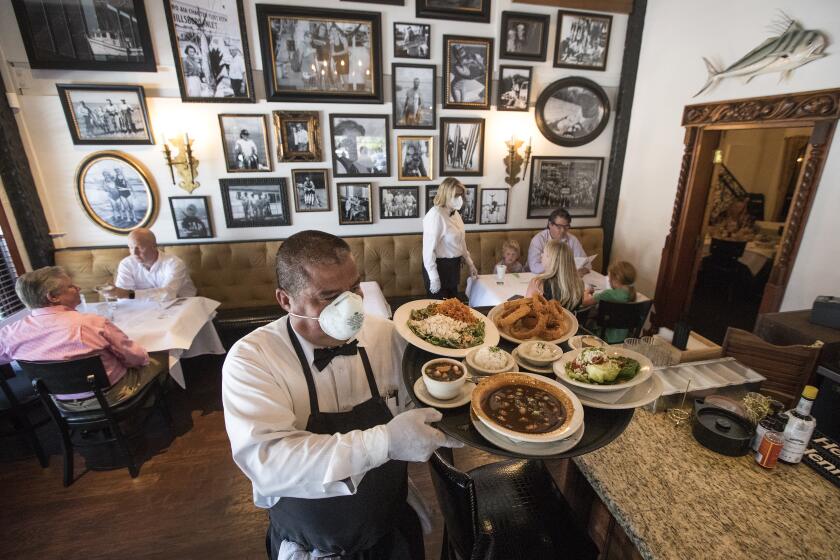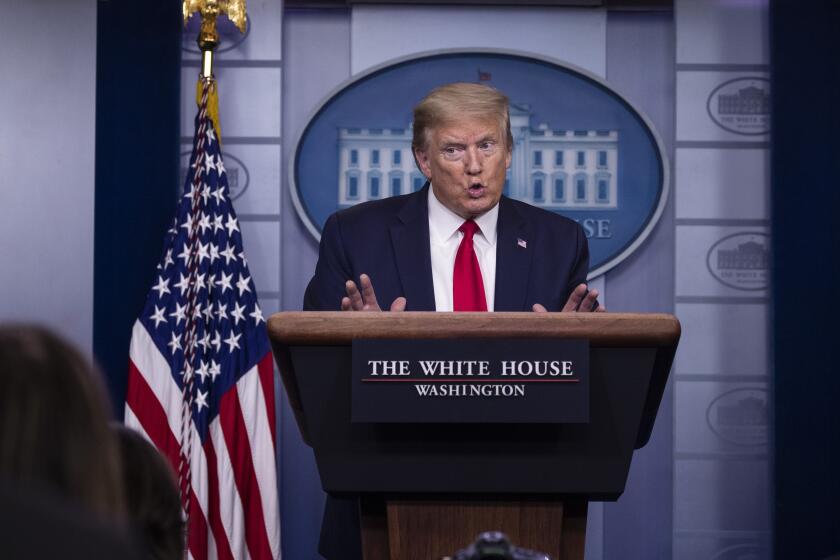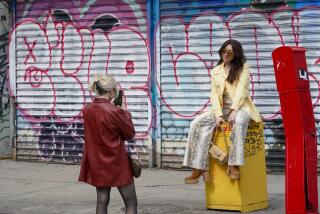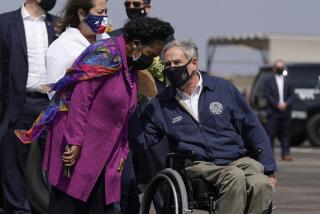COVID-19 death toll surpasses 50,000 in the U.S. as states push ahead with reopenings
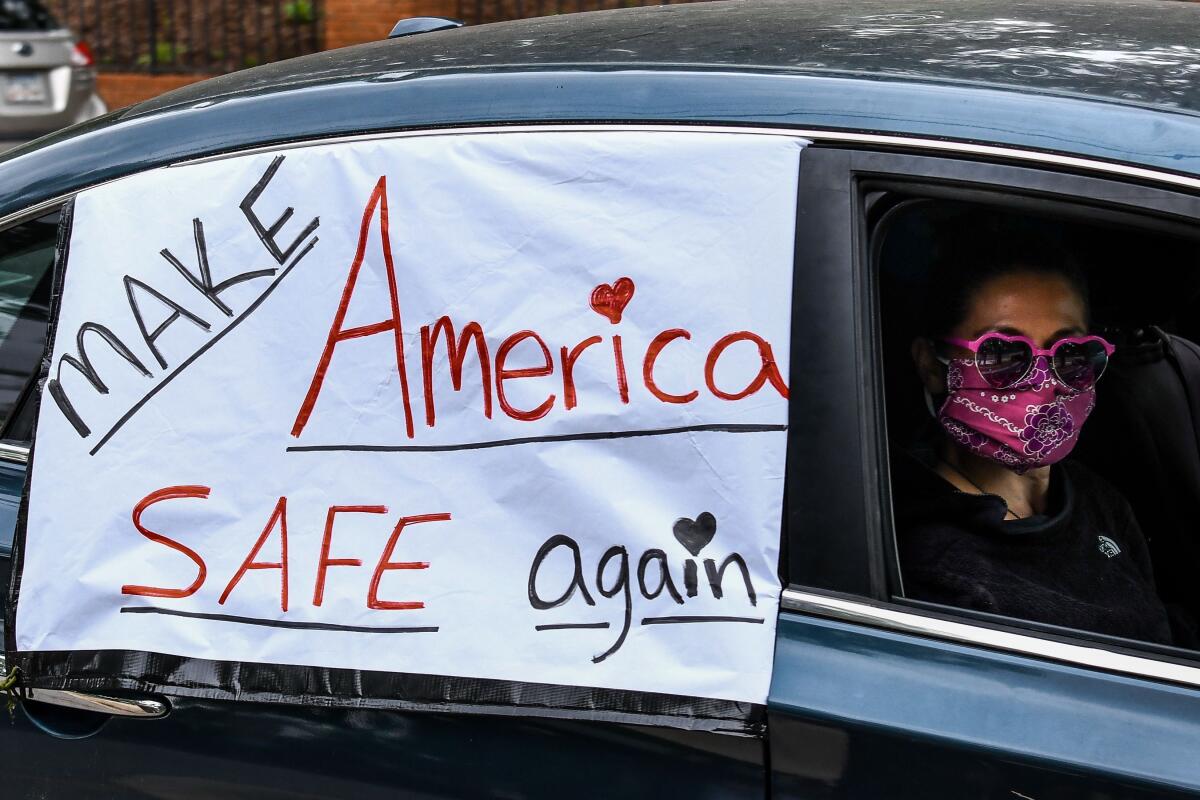
- Share via
The U.S. death toll from COVID-19 surpassed 50,000 on Friday as states and municipalities increasingly started to reopen their economies, some over the warnings of public health experts.
President Trump did not note the dark milestone as he highlighted states that had taken steps to reopen their economies, including California. Half of Americans live in states that have made such moves, he said.
“We’re opening our country; it’s very exciting to see,” Trump said during his daily White House briefing. “The country is a great place, and it’s going to be greater than ever before.”
But in Georgia, Gov. Brian Kemp’s decision to aggressively reopen the state’s economy brought out protesters. They drove around the governor’s mansion in Atlanta on Friday, honking horns and waving signs that said, “Kemp kills,” “You can’t fix stupid, but you can vote it out!” and “Your life is what is essential!”
Kemp made the move over the objections of health experts, the NAACP and some of his state’s mayors, and even Trump, who said Thursday that he thought the governor was moving too fast. (Trump did not mention Georgia at Friday’s briefing.)
Gyms, tattoo parlors, hair salons and bowling alleys were allowed to reopen Friday. Restaurants and movie theaters will follow suit on Monday. More than 890 people in Georgia have died from COVID-19, according to the state’s Department of Health.
“For weeks now, my team has worked closely with the Trump administration and our federal counterparts to mitigate the impact of #coronavirus in Georgia. Our decisions and direction are informed by data and public health recommendations,” Kemp tweeted on Thursday.
The White House’s phased approach calls for states not to start reopening their economies until, among other criteria, they see a decline in reported influenza-like illnesses and documented coronavirus cases for two weeks. Georgia does not meet this standard.
Georgia lifts many coronavirus-related restrictions, allowing gyms, hair salons, tattoo parlors and bowling alleys to reopen Friday.
Some restaurants, shops and other businesses began reopening in Alaska on Friday under the easing of restrictions by Gov. Mike Dunleavy. In a handful of Oklahoma cities, businesses such as barbershops and pet groomers were allowed to open Friday.
In Iowa, the day the state reported its highest single-day increase in confirmed coronavirus infections, Gov. Kim Reynolds announced that nonessential surgeries would be allowed starting Monday as would the opening of farmers markets. At least 107 people have died from COVID-19 in Iowa, according to the state Department of Public Health.
Nebraska Gov. Pete Ricketts announced that churches across the state and restaurants and hair salons in some areas would be allowed to reopen with distancing and other precautions on May 4.
In Michigan, where Gov. Gretchen Whitmer has faced vocal criticism over the state’s restrictions, the governor extended the stay-at-home order through May 15. But she also eased restrictions on some businesses. Nurseries, landscapers and bicycle shops can reopen, and stores selling nonessential items can now do curbside pickup and delivery. Large chain stores will no longer have to block access to departments such as paint, carpet and garden centers.
In Nevada, Las Vegas Mayor Carolyn Goodman, despite days of criticism over her wishes, implored state and federal leaders to allow the city to reopen, saying that city’s desert heat could show whether or not warmth can deter the coronavirus. There is no evidence that heat deters the virus.
Goodman has no authority over the Las Vegas Strip, which is in unincorporated Clark County. But she argued that if the tourism industry does not reopen soon, the city will not survive. Some casinos are taking reservations for May, and Treasure Island announced that it plans to open on May 15 unless it is prohibited from doing so by state order.
Nevada Gov. Steve Sisolak has flatly said that the Strip and gaming venues in general are not opening soon.
Elsewhere, protesters continued to challenge officials who refused to lift restrictions.
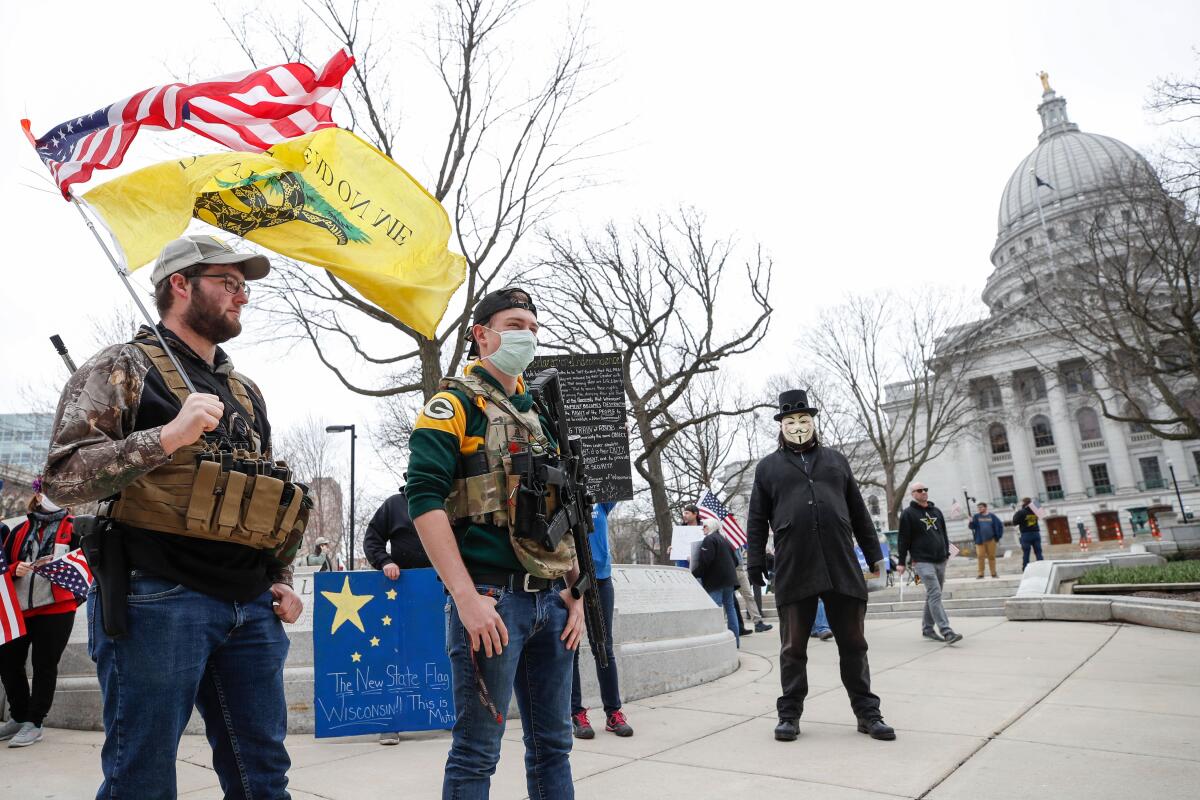
In Madison, one day after Wisconsin Gov. Tony Evers extended his “safer at home” order to May 26, more than 1,000 people gathered at the statehouse to protest the move, carrying signs that read “My body, my choice to work” and waving “Don’t tread on me” banners and American flags.
The gathering was among the largest of such protests that have taken place in recent weeks, though their views do not align with most Americans. A CBS poll released Thursday found that 70% of Americans believe the nation should prioritize slowing the spread of coronavirus, even if that results in short-term economic harm.
There were signs that the pandemic was waning elsewhere, notably in New York City, which has been hit hard by the coronavirus and was among the first places to enact large-scale restrictions to slow its spread. The number of people being admitted to hospitals, being treated in the intensive care unit and testing positive for the coronavirus has declined, Mayor Bill de Blasio said Friday morning.
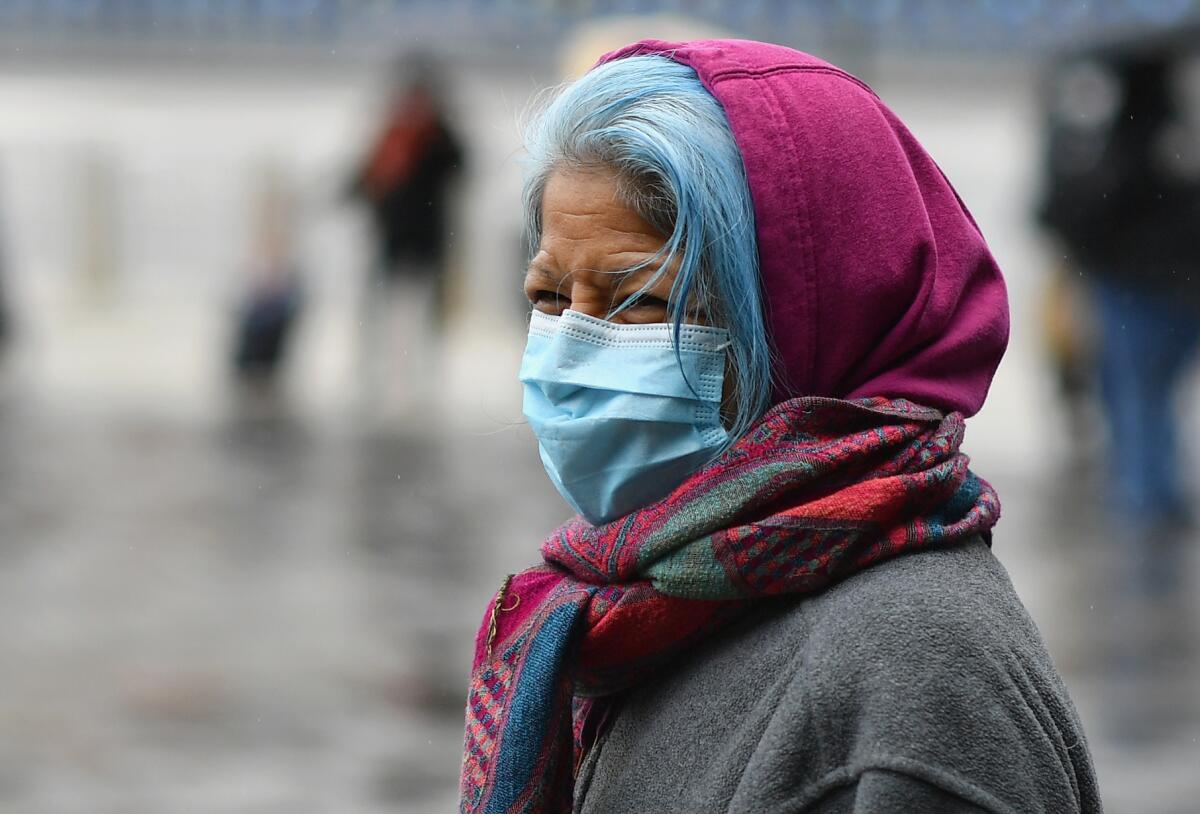
The state of New York also reported declining hospitalization and mortality figures. More than 20,980 people have died of COVID-19 in the state.
“All evidence suggests we’re on the downside of the curve,” said New York Gov. Andrew Cuomo.
However, he warned that the pandemic is creating an economic toll for state and local governments that could affect schools, police and healthcare. The pandemic has already created a $13.3-billion state budget shortfall, Cuomo said, adding that the figure is expected to grow to $61 billion through the 2024 fiscal year.
He blasted the federal government for bailing out airlines and other industries while failing to make state and local governments whole. He saved his greatest ire for Senate Majority Leader Mitch McConnell (R-Ky.), who has referred to federal assistance to states struggling financially under the coronavirus as “blue state bailouts” and suggested they ought to declare bankruptcy.
States are not permitted by federal law to declare bankruptcy. Cuomo dared McConnell to pass legislation to change that.
“Sen. McConnell, pass the law, I dare you. And then go to the president and say, ‘Sign this bill, allowing states to declare bankruptcy,’” Cuomo said. “You want to send a signal to the markets that this nation is in real trouble? You want to send an international message that the economy is in turmoil?”
“Pass that bill, if you weren’t just playing politics,” he added. “We’ll see how long it takes him to do it.”
The Associated Press contributed to this report.
Trump is using the coronavirus crisis as an opportunity — or as political cover — to make sweeping changes to regulations and push controversial new policies.
More to Read
Sign up for Essential California
The most important California stories and recommendations in your inbox every morning.
You may occasionally receive promotional content from the Los Angeles Times.

